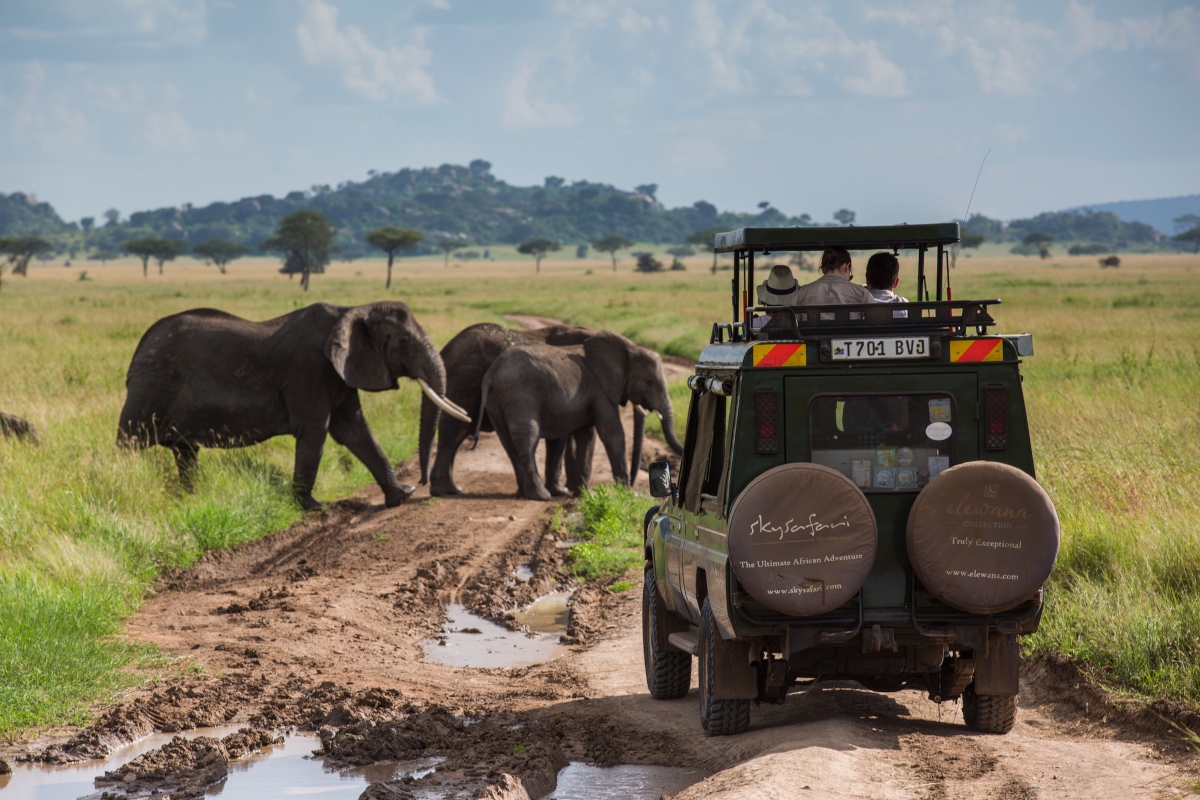When preparing for a thrilling adventure on a Tanzania safari, it is crucial to have the right gear and essentials. You may wonder, “What should I bring on my Tanzania safari?” Well, worry not! We have created a comprehensive Tanzania Safari Packing List to ensure you are fully prepared for your journey into the African bush. From clothing suitable for Tanzania’s hot and dry climate to camera equipment and carry-on restrictions, our packing list covers it all. So, let’s dive in and discover the essential items you need to pack for an unforgettable safari experience. Understanding a Tanzania Safari
A Tanzania safari offers a unique and unforgettable experience, with a diverse range of wildlife, stunning landscapes, and captivating cultural encounters. Embark on a journey to this East African gem and immerse yourself in the wonders of Tanzania’s national parks, game reserves, and conservation areas. Here is a closer look at what makes a Tanzania safari so special.
Tanzania: An East African Safari Destination
Tanzania is the second largest country in East Africa and a renowned safari destination. Located on the picturesque Indian Ocean coast, it shares borders with neighboring countries like Kenya, Uganda, Rwanda, Zambia, Malawi, and Mozambique. This strategic location makes Tanzania an ideal starting point for exploring the remarkable wildlife and natural beauty of the region.
Top Experiences in Tanzania
When it comes to Tanzania safari experiences, the options are endless. Here are a few of the exceptional adventures that await you:
- Excellent Year-round Game Viewing
 Tanzania boasts a rich diversity of wildlife and offers year-round game viewing opportunities. From the iconic savannahs of the Serengeti to the breathtaking shores of Lake Manyara, there are endless opportunities to witness the wonders of nature. Don’t miss the chance to explore the Ngorongoro Crater, Tarangire National Park, Lake Manyara National Park, Ruaha National Park, Nyerere National Park (Selous), Mahale Mountains National Park, and the world-famous Serengeti National Park.
Tanzania boasts a rich diversity of wildlife and offers year-round game viewing opportunities. From the iconic savannahs of the Serengeti to the breathtaking shores of Lake Manyara, there are endless opportunities to witness the wonders of nature. Don’t miss the chance to explore the Ngorongoro Crater, Tarangire National Park, Lake Manyara National Park, Ruaha National Park, Nyerere National Park (Selous), Mahale Mountains National Park, and the world-famous Serengeti National Park. - The Wildebeest Migration One of Tanzania’s greatest wildlife spectacles is the annual Wildebeest Migration. This awe-inspiring phenomenon sees millions of wildebeest and zebra embark on a treacherous journey across the Serengeti-Mara Ecosystem, following the seasonal rains in search of fresh grazing. Witnessing this incredible migration is an experience of a lifetime.
- Unique Cultural Encounters Tanzania is not only home to extraordinary wildlife but also to vibrant and diverse cultures. Engage with local communities and gain insights into their traditions, music, dance, and way of life. Visit the Maasai people, known for their distinctive attire and fascinating customs, and learn about their ancient heritage. Immerse yourself in the local culture and create meaningful connections with the people of Tanzania.
- Off-the-Beaten-Path Adventures In addition to the popular safari destinations, Tanzania offers hidden gems that are off the beaten path. Explore the remote wilderness of Katavi National Park, go chimpanzee trekking in Mahale Mountains National Park, or immerse yourself in the raw and untamed beauty of Gombe Stream National Park. These lesser-known areas offer unique experiences for the intrepid traveler seeking something extraordinary.
Tanzania: A Gateway to East African Safari Wonders
Tanzania is an excellent starting point for exploring the wonders of East Africa. Its close proximity to neighboring countries like Kenya, Uganda, and Rwanda allows for seamless travel between destinations, providing an opportunity to combine multiple safari experiences. From the renowned Masai Mara in Kenya to the captivating gorilla treks in Uganda and Rwanda, East Africa offers a plethora of adventures waiting to be discovered.
Importance of Proper Packing for a Tanzania Safari
Packing for a Tanzania safari is a crucial aspect of preparing for your adventure. Proper packing ensures that you have everything you need to stay comfortable, safe, and prepared throughout your safari experience. In this section, we will discuss two important factors to consider when packing for a Tanzania safari: climate considerations and weight restrictions for air travel.
Climate Considerations for Tanzania Safaris
Tanzania is known for its diverse and ever-changing climates, ranging from hot and humid in coastal areas to cooler temperatures in the highlands. When planning your safari wardrobe, it is essential to take into account these climate variations to ensure you are prepared for any weather conditions.
- Layered Clothing: Given the fluctuating temperatures throughout the day, it is recommended to dress in layers. This allows you to adjust your clothing according to the temperature changes. Mornings can be cool, especially during game drives, while afternoons tend to be warmer. By wearing layers, you can easily adapt to the changing weather conditions and stay comfortable throughout the day.
- Neutral Colors: When selecting your safari clothing, opting for neutral or earthy colors is advisable. Avoid wearing bright colors, as they may attract unwanted attention from wildlife and insects. Neutral colors blend well with the natural surroundings and are less likely to distract or disturb the animals you encounter on your safari.
Weight Restrictions for Air Travel to Tanzania
It’s important to note that most air carriers in Africa impose luggage weight restrictions, typically around 33 pounds per person. It can be quite challenging to pack within these limitations, but it is necessary to adhere to them to ensure a smooth and hassle-free travel experience. Here are some tips to help you pack efficiently:
- Pack Light: Given the weight restrictions, packing light is key. Take only the essentials and avoid overpacking. Select versatile clothing items that can be mixed and matched to create different outfits. This will allow you to pack fewer items while still having enough options for your safari journey.
- Consider the Essentials: Prioritize packing essential items such as comfortable and sturdy walking shoes or hiking boots, insect repellent, sunscreen, a hat, sunglasses, and any necessary medications. These items are vital for your safety, well-being, and comfort throughout your safari adventure.
- Use Packing Cubes: To maximize space and keep your belongings organized, consider using packing cubes. These handy accessories can help compress your clothes, making them more compact and easy to fit within the weight restrictions. Additionally, packing cubes can assist in keeping your items separate and easily accessible during your trip.
Remember, the goal is to pack efficiently while ensuring you have everything you need for an enjoyable and comfortable Tanzania safari. By considering the climate variations and adhering to weight restrictions, you’ll be well-prepared for your adventure in the African wilderness.
Essential Items for Tanzania Safari
When preparing for a Tanzania safari adventure, it’s crucial to pack the right essentials to ensure a comfortable and enjoyable experience. Here are two essential items that should be on your Tanzania safari packing list:
Recommended Camera and Binoculars
A good camera and binoculars are essential tools for capturing the breathtaking beauty of Tanzania’s wildlife and landscapes. Whether you’re a professional photographer or simply want to document your journey, having quality camera equipment can make a significant difference in the quality of your safari photos.
When choosing a camera, opt for a digital SLR or mirrorless camera with a telephoto lens. This will allow you to zoom in and capture detailed shots of animals from a distance. Additionally, consider bringing extra memory cards and batteries to ensure you don’t miss any incredible moments.
Binoculars are equally important for observing wildlife up close. They allow you to appreciate the finer details of Tanzania’s fauna and ensure you don’t miss any hidden gems during game drives or nature walks. Look for lightweight, compact binoculars with a magnification power of at least 8x to enhance your safari experience.
Importance of a Tropical Hat for Safari
A tropical hat is a must-have accessory for any Tanzania safari. With the sun shining brightly in the African bush, it’s essential to protect yourself from harmful UV rays and excessive heat. A good quality hat will shield your face, neck, and ears from direct sunlight, reducing the risk of sunburn and heatstroke.
When choosing a tropical hat, opt for a wide-brimmed hat made from breathable and lightweight material such as cotton or straw. This will provide excellent sun protection while allowing air circulation to keep you cool.
Additionally, consider a hat with an adjustable chin strap to secure it during windy safari drives or outdoor activities. This will ensure your hat stays in place even during exciting wildlife encounters.
Remember, having the right equipment like a camera, binoculars, and a tropical hat will enhance your Tanzania safari experience and allow you to fully immerse yourself in the wonders of the African wilderness.
Clothing for a Tanzania Safari
When it comes to preparing for a Tanzania safari, having the right clothing is essential for a comfortable and enjoyable experience. In this section, we will discuss the recommended clothing for both hot and dry weather as well as changing weather conditions.
Clothes for Hot and Dry Weather
Tanzania is known for its hot and dry climate, so it’s important to pack lightweight and breathable clothing that will keep you cool and protected from the sun. Here are some clothing items to consider:
- Lightweight Shirts: Opt for loose-fitting, long-sleeved shirts made from moisture-wicking fabric to help keep you cool and protect your arms from the harsh sun. Light colors are also recommended to reflect heat.
- Comfortable Trousers: Choose lightweight, quick-drying trousers or safari pants that are breathable and offer protection from the sun and insects.
- Wide-Brimmed Hat: Invest in a wide-brimmed hat to shield your face and neck from the sun. A hat with a chin strap is ideal to prevent it from blowing away in the wind.
- Sunglasses: Don’t forget to bring a good pair of sunglasses to protect your eyes from the intense sunlight.
- Sturdy Footwear: Opt for closed-toe shoes or comfortable hiking boots to protect your feet from the rugged terrain.
Clothes for Changing Weather Conditions
While Tanzania typically experiences hot and dry weather, it’s important to be prepared for sudden changes in weather, especially if you’re visiting during the rainy season. Here are some clothing items to consider:
- Lightweight Rain Jacket: Pack a lightweight, waterproof rain jacket that can easily be folded and carried in your daypack.
- Layering Tops: Bring a mix of short-sleeved and long-sleeved tops that can be layered to accommodate temperature changes throughout the day.
- Convertible Pants: Consider packing convertible pants that can be zipped off into shorts when it gets warmer or zipped back on when the weather cools down.
- Light Fleece or Jacket: Having a light fleece or jacket on hand is useful for cooler mornings and evenings, or for layering during unexpected temperature drops.
Remember to pack enough clothing based on the duration of your safari and make sure to check the specific weather conditions for the time of year you’ll be visiting Tanzania. By being prepared with the right clothing, you can have a comfortable and enjoyable safari experience.
Renting Equipment through African Scenic Safaris
Renting equipment can be a convenient and cost-effective solution for travelers embarking on a Tanzania safari. African Scenic Safaris offers equipment rental services to ensure that you have everything you need for a successful and enjoyable safari experience. In this section, we will discuss the equipment not included in Tanzania safari packages and how you can rent the necessary items.
Equipment Not Included in Tanzania Safari Packages
While Tanzania safari packages offered by African Scenic Safaris are comprehensive and well-equipped, there are certain items that are not included. It’s important to be aware of these items so that you can plan accordingly and make arrangements to rent them. Some of the main equipment not typically included in the packages are:
- Binoculars: Binoculars are essential for spotting wildlife and birds from a distance. Having a good pair of binoculars can greatly enhance your safari experience, allowing you to observe animals in their natural habitats with greater detail.
- Camera Equipment: If you are an avid photographer, it’s likely that you will want to bring your own camera gear. However, if you don’t have the necessary equipment or prefer to travel light, you can rent cameras, lenses, and other accessories from African Scenic Safaris.
- Personal Gear: Each traveler will have their own personal gear requirements, such as hiking boots, trekking poles, sleeping bags, and backpacks. These items are not typically included in the safari packages, so it’s important to ensure that you have them or make arrangements to rent them.
How to Rent Equipment
Renting equipment through African Scenic Safaris is a straightforward process that can be done in advance or upon arrival. Here’s how you can rent the necessary equipment for your Tanzania safari:
- Contact African Scenic Safaris: Reach out to the African Scenic Safaris team via their website or through their contact information to inquire about equipment rental options. Provide them with details about the items you need and the duration of your rental.
- Discuss Rental Terms and Pricing: The team at African Scenic Safaris will provide you with information about the availability, rental terms, and pricing. They will guide you through the selection process and help you choose the right equipment for your needs.
- Confirm the Rental: Once you have made a decision on the equipment you wish to rent, confirm the rental with African Scenic Safaris. They will make arrangements to have the equipment ready for you either before your arrival or upon arrival at your destination.
- Pick up and Return: Depending on your agreement with African Scenic Safaris, you can either pick up the rented equipment from their office or have it delivered to your accommodation. Make sure to return the equipment in good condition at the end of your rental period.
Renting equipment through African Scenic Safaris takes the hassle out of bringing your own gear and ensures that you have access to high-quality equipment during your safari. It allows you to travel light and still have everything you need to make the most of your wildlife encounters and photographic opportunities.
Key Considerations for Backpack Planning
Before you start packing your backpack for your Tanzania safari, there are a few important factors you should take into consideration. These include the duration of your safari, the specific activities you’ll be participating in, the weather conditions, and any weight or size restrictions imposed by your travel provider. By considering these factors, you can ensure that your backpack is tailored to meet your specific needs and requirements.
Tips for Efficient Packing
- Make a List: Start by creating a comprehensive packing list to help you stay organized and ensure you don’t forget any essential items. Categorize your list into sections such as clothing, toiletries, electronics, and documents, making it easier to check off items as you pack them.
- Pack Light: Remember, you’ll be carrying your backpack around during your safari, so it’s crucial to pack only the essentials and avoid overpacking. Stick to versatile clothing items that can be layered, and opt for lightweight and compact items whenever possible.
- Layering and Versatility: Since weather conditions can vary during your safari, dressing in layers is highly recommended. Pack lightweight and breathable clothing that can be easily layered, allowing you to adjust your outfit based on the temperature.
- Appropriate Clothing: While on safari, it’s important to dress appropriately for both comfort and practicality. Opt for neutral-colored clothing that blends with the surroundings and helps to camouflage you from the wildlife. Don’t forget to pack a wide-brimmed hat, sunglasses, comfortable walking shoes, and a lightweight rain jacket in case of unexpected showers.
- Essential Travel Documents: Safeguard your travel documents, such as your passport, visa, travel insurance, and any necessary permits or vouchers, in a waterproof and secure bag or pouch. It’s also wise to carry digital or physical copies of these documents as a backup.
- Medications and First Aid: Pack any necessary prescription medications in their original containers along with a small first aid kit containing essentials like band-aids, antiseptics, pain relievers, and any personal medication you may require.
- Snacks and Hydration: While your safari operator will likely provide meals and refreshments, it’s always a good idea to carry a few energy bars, trail mix, or other lightweight snacks to keep you fueled during your wildlife watching adventures. Additionally, pack a reusable water bottle and consider bringing water purification tablets or a water filter for refills in areas with limited clean water access.
- Secure Packing: Invest in packing cubes or compression bags to maximize space and keep your belongings organized within your backpack. Additionally, use ziplock bags to store toiletries and prevent any leakage or spillage.
- Leave Room for Souvenirs: If you plan on purchasing souvenirs or gifts during your trip, leave some extra space in your backpack to accommodate them on your way back.
Remember, the key to efficient packing for your safari adventure is to strike a balance between packing light and ensuring you have all the necessary essentials. By following these tips and taking the time to plan and organize your backpack beforehand, you’ll be well-prepared and ready to fully immerse yourself in the wonders of Tanzania’s wildlife.
Conclusion
When it comes to packing for a Tanzania safari, careful consideration is key. The right gear and essentials can make all the difference in ensuring a comfortable and enjoyable adventure. It’s important to take into account the climate and weather conditions, as well as any weight restrictions imposed by airlines. With the proper Tanzania safari packing list, you can be well-prepared for your safari tours and have a clearer picture of what you actually need. So, make sure to pack appropriate clothing, a good camera, binoculars, and any other necessary items to make your safari experience safe and memorable.


 Tanzania boasts a rich diversity of wildlife and offers year-round game viewing opportunities. From the iconic savannahs of the Serengeti to the breathtaking shores of Lake Manyara, there are endless opportunities to witness the wonders of nature. Don’t miss the chance to explore the Ngorongoro Crater, Tarangire National Park, Lake Manyara National Park, Ruaha National Park, Nyerere National Park (Selous), Mahale Mountains National Park, and the world-famous Serengeti National Park.
Tanzania boasts a rich diversity of wildlife and offers year-round game viewing opportunities. From the iconic savannahs of the Serengeti to the breathtaking shores of Lake Manyara, there are endless opportunities to witness the wonders of nature. Don’t miss the chance to explore the Ngorongoro Crater, Tarangire National Park, Lake Manyara National Park, Ruaha National Park, Nyerere National Park (Selous), Mahale Mountains National Park, and the world-famous Serengeti National Park.
